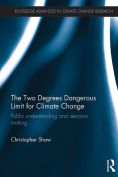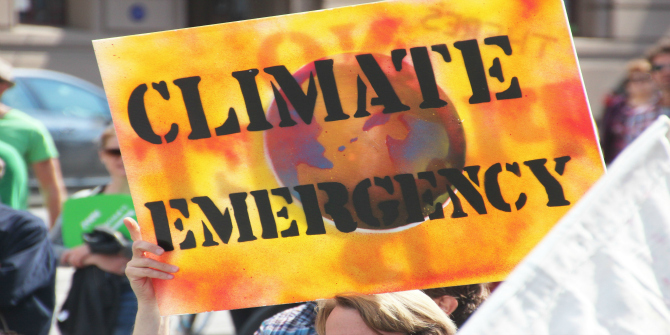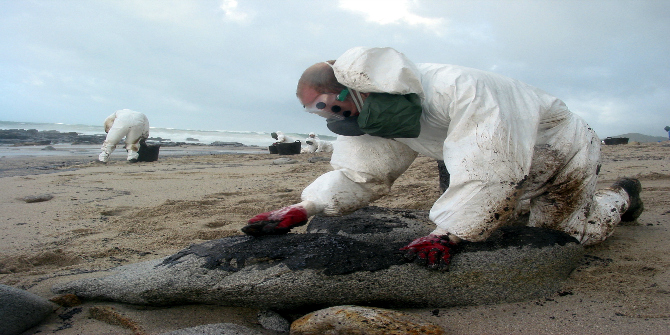In The Two Degrees Dangerous Limit for Climate Change: Public Understanding and Decision Making, Christopher Shaw explores environmental policymaking by focusing on the public circulation of 2°C as the widely cited maximum figure by which temperatures can be allowed to rise. Derek Wall praises the book for combining natural science and social science to offer a well-researched and provocative interrogation of policy claims made about climate change.
The Two Degrees Dangerous Limit for Climate Change: Public Understanding and Decision Making. Christopher Shaw. Routledge. 2015.
 Environmental campaigners have argued that 2°C is the maximum that temperatures should be allowed to rise before climate change becomes catastrophic. In this fascinating and provocative book, The Two Degrees Dangerous Limit for Climate Change: Public Understanding and Decision Making, Christoper Shaw argues that this figure is arbitrary from a scientific point of view and is a product of political expediency. While we think of climate change as primarily a problem for scientists, Shaw indicates that what we know of the science is powerfully shaped by social, economic and political forces. With an international climate conference currently taking place in Paris between 30 November and 11 December 2015 (COP21), this book is an important account of why we should be sceptical of many of the policy claims made about climate. The two degree limit was constructed as a campaigning tool, but has failed to mobilise action and has tended to reinforce the perception of climate policy as something outside of democratic control and debate.
Environmental campaigners have argued that 2°C is the maximum that temperatures should be allowed to rise before climate change becomes catastrophic. In this fascinating and provocative book, The Two Degrees Dangerous Limit for Climate Change: Public Understanding and Decision Making, Christoper Shaw argues that this figure is arbitrary from a scientific point of view and is a product of political expediency. While we think of climate change as primarily a problem for scientists, Shaw indicates that what we know of the science is powerfully shaped by social, economic and political forces. With an international climate conference currently taking place in Paris between 30 November and 11 December 2015 (COP21), this book is an important account of why we should be sceptical of many of the policy claims made about climate. The two degree limit was constructed as a campaigning tool, but has failed to mobilise action and has tended to reinforce the perception of climate policy as something outside of democratic control and debate.
Shaw argues that social science is as important as natural science in dealing with climate change and other environmental problems. The impact of climate change is studied by scientists and involves much complexity, but the damage caused by climate change is determined by what we value collectively in society. The effect of the possible rise in sea levels will be assessed differently by islanders in Oceania, threatened with losing their homes, and by politicians in New York or London. Policies to tackle climate change are also conditioned socially in several ways. Rather than simply being technological fixes which are neutral, they will also have diverse impacts on different social classes, genders, ethnicities, etc.
Shaw takes a critical realist and social constructionist approach to the two degrees limit. Both critical realism and social constructionism are research methodologies that have proved controversial. Critical realism argues that social scientists can investigate the ‘real’ like natural scientists, but that social reality is likely to change and is conditioned by human perceptions. Social constructionism argues that all we understand is filtered through language or other systems of symbols. Such approaches to the sociology of knowledge may frustrate activists and natural scientists worried by the effects of climate change. Both groups might argue that such perspectives can distract us from the ill effects of rising temperatures, ocean acidification, extreme weather patterns and other likely symptoms of climate change.
Shaw makes a persuasive case that if we want to deal with climate change, we must accept that policies to reduce the growth of greenhouse gas emissions will only gain support if society accepts them. Policymaking involves not just technocratic decisions, but also work to make the symbols communicate so as to persuade politicians and the public to take action.
 Image Credit: Takver
Image Credit: Takver
The book provides a detailed theoretical account of how the social construction of science works and has a material effect. A strong point is that such potentially dense discussion is presented very clearly. An extremely attractive feature is that this text is a pleasure to read and a good introduction to those unfamilar with such debates. It is also backed by strong practical research based on interviews with scientists, policymakers and journalists.
Natural science often involves complexity and uncertainty. The science around climate change is especially complex, yet this is something that politicians, the public and, perhaps especially, the media find unacceptable. ‘Probable’ is not enough to inspire policy changes, so vast oversimplifications occur; the two degrees danger limit is therefore a largely metaphorical attempt to inspire change. However, as Shaw convincingly argues, it is likely that smaller increases in temperature will also create major costs. He suggests that not only is two degrees a convenient metaphorical device, but also that it implies that a narrative of non-threatening climate action can be told. Potentially climate change might threaten economic growth, capitalism and perhaps even conventional industrial production. However, if this message was presented, many campaigners believe that it would make action unpalatable, so a less threatening message is put forward instead.
In essence, ecological problems may be so complex to communicate that existing institutions may fail to act in any meaningful way. The present policy suggestions for dealing with climate change tend to be elite-driven, ignore social effects and fail to include democratic input. Those passionate about climate change may view policy as a black box: in the urge to do something about climate change, the practical effects on both human society and other species can be forgotten.
This book is far from comfortable reading, but it is accessible, well-researched and deals with an important but often ignored perspective on climate change. The complexity of natural science, the resistance of powerful lobby groups who seek to perpetuate a carbon-based economy and our preference for simple solutions: all these threaten a perfect storm.
Climate sceptics might take comfort from this book, and there is much to be sceptical about. Climate change effects are uncertain and the policies are not without cost. However, the potential consequences of temperature rises below two degrees and the effect of ocean acidification because of the absorption of CO2 suggest that the current discourse is too conservative about the risks. Nonetheless, if climate change is to be tackled, an approach that views populations as passive recipients of policies engineered from above is unacceptable. Shaw notes that the approach of Elinor Ostrom, the political economist who was the first woman to win a Nobel Prize for economics, is a vital part of an alternative framework on climate change. In short, Ostrom argued that democratic self-governance was essential for dealing with ecological problems, providing a stake for populations in policies, harnessing creativity and challenging top-down solutions.
Shaw’s book is far from perfect. Sometimes his discussion of ideology hints that we are being deliberately lied to, but those proclaiming an ideology are often those who most strongly believe it to be true. Likewise, critical realism that combines both natural scientific and social/cultural dimensions is more difficult to sustain than simple realism, which ignores such slippery elements. I am sure that the difficulties that Shaw presents will lead many of those most motivated by ecological politics to ignore what he has written. However, if we want a sustainable future, the social dimension of enviromental change cannot be wished away, and Chris Shaw has provided a good introduction which deserves to be read.
This review originally appeared at the LSE Review of Books.
Please read our comments policy before commenting.
Note: This article gives the views of the authors, and not the position of USApp– American Politics and Policy, nor of the London School of Economics.
Shortened URL for this post: http://bit.ly/21GIeS6
——————————————–
Derek Wall teaches radical political economy at Goldsmiths College, University of London. He is currently International Coordinator of the Green Party of England and Wales. His books include Economics After Capitalism (Pluto, 2015) and The Sustainable Economics of Elinor Ostrom (Routledge, 2014). You can follow him on twitter @Anothergreen






